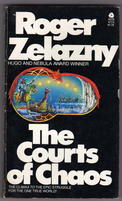
| Series: | Amber #5 |
| Publisher: | Avon |
| Copyright: | February 1978 |
| Printing: | September 1979 |
| ISBN: | 0-380-47175-2 |
| Format: | Mass market |
| Pages: | 142 |
This is the fifth book of a five-book chunk of story and directly (if oddly) follows the events of The Hand of Oberon. You don't want to start reading the series here.
This is such a strange series.
At the end of the previous book, Zelazny had finished rewriting the first couple of books with a rash of different perspectives, set up the players for a grand finale, and added a bit more depth to Corwin's huge family. It seemed like good momentum going into the final book, setting up a climactic confrontation with chaos with a host of magical rules and artifacts on the playing board.
So, of course, The Courts of Chaos starts by skipping over a significant change of leadership, all the initial planning, and several initial moves in that final conflict, and leaves it to the reader to piece them together in retrospect. I can respect starting in medias res, but I wanted to read those parts of the story! Well, perhaps not, given that Corwin was apparently completely sidelined, but that itself seems like an odd choice.
Then, once the reader is included back in what seemed to be the main direction of the story, Corwin is sent off on a solo expedition to carry a powerful magical artifact to the battlefield. What follows is about seventy pages of at best a side quest and at worst complete pointlessness, as Corwin does more boring hellrides, has relatively unimportant adventures in random shadow worlds, interacts with a few newly-introduced magical creatures (didn't we have a large enough cast?) who seem to serve little final point in the story, and muses about the nature of reality.
It sucks all the momentum out of the story. By the time Corwin finally gets to where all the other action is happening, my main reaction was relief from boredom. The Courts of Chaos reminds me of a computer RPG where, right before the plot finale, the party has to get from point A to point B, and the path involves several annoying sidequests involving fixing someone's well, killing some nearby monster to get a widget that one needs to cross a bridge, and retrieving several plot coupons to get through some passage. It felt like padding, and not very good padding.
When we finally get to the story I thought I was getting at the start of the book, it's not bad, but it's also confused. Zelazny keeps the major world-shaking events off-screen and focuses on his cast's attempts to guess at what's really going on. This odd choice has some merits: it gives a feeling of mythic significance to the off-screen events that would have been hard to produce otherwise, and it sets up a very effective and memorable climactic moment. Zelazny also pulls off a few interesting reversals and one moderately interesting reveal as part of the end of the book. It's not a traditional ending, and the traditional ending with Corwin as the hero would have been less interesting.
But I just can't get over that pointless middle section of this book. Long travelogues are rarely effective in fantasy in the best of circumstances, and Zelazny's timing on this one undermined his story momentum for me almost completely. There are a few side incidents and side characters on Corwin's travels that I liked reading about, and would have been more interested in had they turned up in the first or second book when I was still in the mood to explore Zelazny's world. But given the surrounding suspense, the constant knowledge that significant events are happening elsewhere, and the already excessive cast, my primary reaction was frustrated impatience.
This is the last book of the first five-book story arc of Amber. (There are five more books added some time later, but they're optional, generally considered to be less good, and form a separate story arc.) While Zelazny does some creative and surprising things with the story and certainly doesn't follow normal fantasy conventions or structure, I can't bring myself to recommend the series for pure entertainment. It has too many flaws, frustrations, and stretches of bad writing. It's worth reading for background's sake, since it's widely read, frequently referred to, and influential on the genre, but prepare to be frustrated, occasionally confused, and occasionally bored.
Reviewed: 2011-12-20